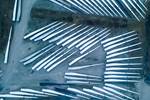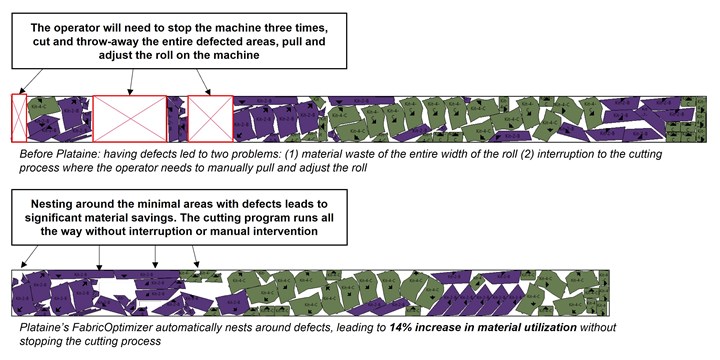Plataine FabricOptimizer increases aerospace composites manufacturing production rates
New capabilities have been unveiled — including a procurement simulator, “nesting around defects” solution and detailed reports — to improve the ordering process, reduce waste and enhance efficiency.
Share
Read Next
Plataine (Waltham, Mass., U.S.), a provider of AI-based manufacturing optimization solutions, has released a new version of its FabricOptimizer offering to address the supply chain and workforce challenges aerospace manufacturers face today. Plataine’s new version of the FabricOptimizer solution is said to enable advanced manufacturers to reach increased production rates, full process automation and further maximize material use by creating efficient cut plans. New capabilities include a material procurement simulator, an automatic “nesting around defects” solution, and detailed reports to improve yield and “first time right” score.
According to Plataine, the company’s AI-based “nesting around defects” solution enables manufacturers to deliver the most optimized dynamic cut plans that make the best possible use of material rolls with known defects. These new capabilities help to reduce errors, rework and material waste leading to continuous process improvement. Users can now retrieve information of known defects on rolls, ignore specific parts of a roll when nesting and maximize material use. Quality is ensured, while the amount of material going to waste is minimized, improving customers’ ability to maximize on-hand inventory, especially during times where lead time for receiving new material is long.
In addition, higher material buy-to-fly ratio aligns with recent sustainability and green credentials alongside manufacturers’ profits. FabricOptimizer enables the operator to nest around the defects, avoiding cutting defected plies that would require recuts and rework. Moreover, this solution supports commonly used formats and systems and can be easily implemented.
The simulation tool is embedded as part of Plataine’s FabricOptimizer solution, enabling manufacturers to take existing stock into account and avoid unnecessary waste when purchasing expensive materials. This tool reportedly enables faster response to bids and displays recommendations for material planning and procurement. With AI-based technology, users can test out a variety of input details, such as various roll widths or different quantities of kits to ensure the best yield and get recommendations on which material should be ordered for each kit, or number of kits. The simulation tool also saves operators time by automatically selecting different options and material quantities to create the most optimized cut plan for specific kits.
“Material order lead time requires manufacturers to maximize their current stock,” Anat Kanner-Kalka, director of product management at Plataine, says. “The easy-to-use simulation tool and ‘nesting around defects’ further meets the needs of our customers for dynamic solutions that improve the ordering process, reduce waste and enhance efficiency. As FabricOptimizer evolves, we will continue to meet the needs of forward-thinking manufacturers and help them ramp up production rates.”
Related Content
-
Ultra high-rate composite deposition system trials to surpass layup targets
The NCC, alongside partners Loop Technology, Coriolis and Güdel, are on track to deliver dry fiber deposition rates exceeding 350 kilograms/hour, seven times more than standard aerospace rates.
-
Adaptive composite elements for building facades exhibited at JEC World 2023
University of Stuttgart institutes use carbon and glass fiber composites, robotic fabrication, biomimetic design and digial twin/control to demonstrate adaptive facade elements for future buildings.
-
Schrödinger advances materials informatics for faster development of next-gen composites
Cutting time to market by multiple orders of magnitude, machine learning and physics-based approaches are combined to open new possibilities for innovations in biomaterials, fire-resistant composites, space applications, hydrogen tanks and more.
















